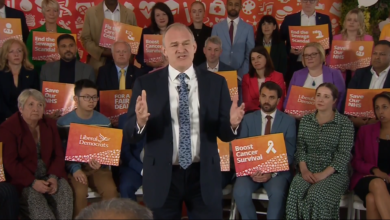Commercial director of Gloucestershire firm JBS Mechanical on community, investment and the future

JBS Mechanical is a multi-million-pound Gloucestershire powerhouse, with projects spanning the county and beyond. The man in charge of guiding clients and producing these high-budget and quick turnaround projects? Simon Rowe.
In SoGlos’s latest interview with the JBS management team, Simon discusses his path to becoming commercial director, as well as the range of successfully delivered projects that have impacted the communities that surround them.
How did you come to the position of commercial director at JBS Mechanical?
I started working at JBS in October 2015 as a contracts manager after working previously for another mechanical company for 10 years as an engineer. Then I ended up working as a foreman, but I had no opportunities to move further up the ladder — and I was ambitious.
At JBS, I made it to the position of head of major works in 2020, overseeing all mechanical projects, before being made commercial director in 2024, with key responsibilities including taking a project from the design stage all the way to completion.
I guide clients down the correct path so that they can get the best value mechanical services — in all aspects from domestics, heating and drainage, to gas, air conditioning, sprinklers and dry risers.
JBS has taken on some huge projects in the past, can you highlight some of the key ones?
The largest project I’ve been involved in was undertaking the conversion of an office building into 286 flats in Swindon. It was for one of our long term clients, where we took on full mechanical responsibilities which included a central plant room that would feed boosted water to every apartment and a sprinkler system throughout the building.
We took this 18-month project on right from the design stage and worked closely with the main contractor to deliver on budget and on time — two years later the flats are pretty much at capacity.
We also do work on leisure centres, schools, hotels and hospitals which are all normally sizable projects that need a quick turnaround.
Importantly, the projects benefit the areas they’re in with new jobs created — we try to use local labour where possible. The mechanical side does a lot of projects on the outskirts of London — we have several teams that live in the local areas and these teams have worked with us for over five years, so they’re very trusted.
How do you gather and incorporate feedback from the clients into your projects?
We
have a close involvement on a lot of our projects and talk regularly with
clients about how we can improve on meeting their ideas and demands.
We get a
lot of repeat business from some regular clients — we’ve completed over
25 projects for one client and we’re currently working on four live projects at the moment.
Can you provide any examples of how your projects have improved the quality of life for local residents?
Over the last 18 months we have undertaken the refurbishment of two local care homes for a major contractor. This featured new mobility baths that have integrated bath lifters — that’s just one example.
We also pride ourselves on fast response to breakdowns, so if a client, new or old, has boiler trouble etc. we attend or get the manufacturer in ASAP to rectify any issues.
Speaking of the local community, do you have any charity collaborations or do you work with any local organisations?
Both Sean and Jordan feel
very strongly about giving back to the community. Last year we were involved
with Cheltenham Town Football Club as a sponsor and this year we have been involved
in sponsorship at Gloucester Rugby Club.
The team also supports grass roots clubs,
we sponsor a few youth football and rugby clubs and have also previously been
sponsors in charity boxing events.
What sustainable practices do you implement in your projects and how do these benefit the local community and environment?
There’s been a big change in recent years with more sustainable solutions in the plumbing and heating industry. We’ve done a lot of projects where we’re fitting air source heat pumps rather than boilers, eliminating the need for gas. We’ve also installed ground source in projects which would have had to have gone down the oil route, as well as being involved in passive houses and MVHR systems that give better EPC ratings to flats.
We try to get all our engineers on training courses for new sustainable kit, so that they have a strong knowledge in the field.
In your opinion, what types of buildings and infrastructure are most needed in Gloucestershire in the near future?
The Gloucester Docks has had a serious amount of investment over the past ten years or so, but there are still a few derelict buildings that could be transformed with the right investment.
As commercial director, do you have any future goals that you’d like to see JBS meet?
I would like to carry on
growing the business, the company has grown a lot since I started and would be
nice to see it turn over £10 million in the next three to five years.
We have a great, hard-working team at JBS and we are fully aware that you need everyone working and
communicating well for the company to continue to grow.
We’re also passionate about investing in
apprentices to do our part in growing the trade and training the future of the plumbing and
heating industries.





